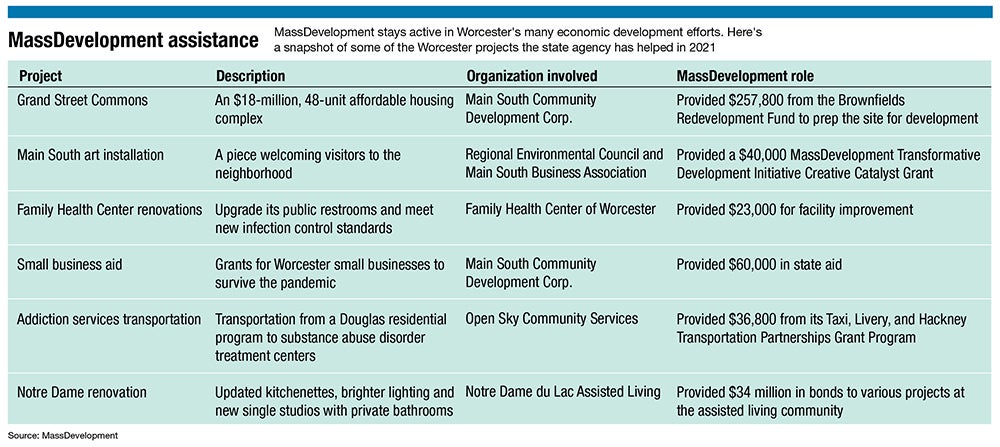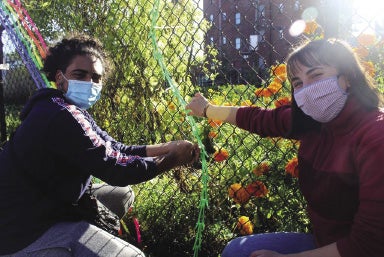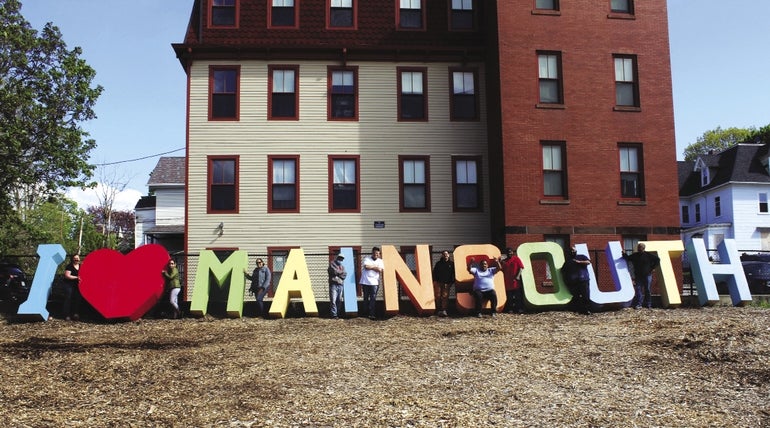State economic-development agency MassDevelopment – which provides financing solutions such as low-interest loans and tax credits to developers, businesses, nonprofits and communities – has been a major player in Worcester’s urban growth initiatives.
Get Instant Access to This Article
Subscribe to Worcester Business Journal and get immediate access to all of our subscriber-only content and much more.
- Critical Central Massachusetts business news updated daily.
- Immediate access to all subscriber-only content on our website.
- Bi-weekly print or digital editions of our award-winning publication.
- Special bonus issues like the WBJ Book of Lists.
- Exclusive ticket prize draws for our in-person events.
Click here to purchase a paywall bypass link for this article.
State economic-development agency MassDevelopment – which provides financing solutions such as low-interest loans and tax credits to developers, businesses, nonprofits and communities – has been a major player in Worcester’s urban growth initiatives.
Part of the city’s multilayered, collaborative approach involving state, federal and local partners, MassDevelopment offers programs in areas of real estate, financing and more specialized sectors, such as manufacturing.
When it comes to these programs, Worcester Chief Development Officer Peter Dunn says the city has taken part in just about all of them.

“The City of Worcester and organizations in the community have benefitted from just about every tool in MassDevelopment’s toolbox,” Dunn said.
These tools include the Collaborative Workspace Grant Program, Dunn said, which supported makerspace Technocopia and other affordable workspaces for gig-economy workers. He said the Brownfields Redevelopment Fund – programming just right for a post-industrial municipality like Worcester – has supported projects such as the $160-million Polar Park public baseball stadium.
New Markets Tax Credits, designed to stimulate investment in low-income areas, were part of the redevelopment of the former Telegram & Gazette building, now home to Quinsigamond Community College. MassDevelopment was a collaborator in the complex, three-year deal providing other financing sources as well, such as loans and a mortgage insurance guarantee.
Programs assisting lower-income areas can produce some of the more dramatic turnarounds, of course, requiring boots-on-the-ground outreach, layers of collaboration and plentiful patience while results are in motion.
“We celebrate the small wins, but it does take time,” said MassDevelopment’s Marcos Marrero, executive vice president of community development.

Investing in reuse
Downtown’s 526-538 Main St. – the former Pawn Shop building in the Theatre District – was bought by MassDevelopment in 2017. The agency made façade improvements before offering the property to investors. This work was done through the agency’s Transformative Development Initiative Equity Investment program, offered in targeted focus areas throughout the state known as Gateway Cities.
Worcester was named a Gateway City in 2014.
With properties vacant or underutilized, Marrero said, their use changes as building codes get updated and modernized, with their infrastructure – roofs, electrical and piping – deteriorating over time. Eventually, owners can’t take on the expense of improving them when comparing that investment to what the cost would command in rent payments and the ability to pay off a commercial mortgage.
“So a building needs a whole bunch of work,” he said.
But 526-538 Main St. has been in good hands with MassDevelopment, with public subsidies addressing that funding gap.
Now, many years in the making, a fall closing is set for Washington, D.C. developer Menkiti Group to purchase 526-538 Main St., with New Markets Tax Credits in play. The building will offer retail, arts and cultural uses to keep with the character of the area.
“People can often see development as ‘That thing that got built,’ but that’s just the tip of it,” said Marrero.

Main South focus
MassDevelopment’s investment and the work of TDI Fellow Ivette Olmeda have helped the Main South neighborhood, said Dunn. Culturally diverse, the relationships and networks Olmeda has built in the five-block area near City Hall and Clark University have paid off.
“The efforts of Ivette Olmeda cannot be overstated,” says Dunn. “She has helped build a bridge between the small businesses in the community and the government resources that are available to help.”
When the coronavirus pandemic hit, these existing lines of communication on how to access emergency businesses relief became vital. Olmeda said all but one of the 30-something businesses in Main South survived the COVID-19 crisis.
“These are minority business owners. Some are immigrants,” said Olmeda, of the mainly mom-and-pop restaurants, barbershops and nail salons. “It took a little while to create that trust, but it is worth it.”
Olmeda said work to enhance public and private engagement in TDI zones means making the business community self-sustainable.
“We create those connections, but at the same time – working as TDI Fellows on the ground – we know that one day, we are not going to be there. We have to create sustainability among partners,” she said.
In 2019, the Main South Business Association was created so business owners could bond with one another. Signage was made more uniform and more lighting was added, along with public-space infrastructure to add more vibrancy to the area, said Olmeda.
Further solidifying Main South as its own brand is the next step, said Olmeda, promoting its community gardens, Castle Park, and unique foods, art, language, clothing and products from Caribbean, Latin, African and other countries to celebrate diversity. A step toward that goal is a new public art installation, made possible with a $40,000 grant from the Regional Environmental Council and community partners including MassDevelopment.
The agency just awarded $257,800 to Main South Community Development Corp., to assess and remediate a vacant lot for a mixed-use retail and affordable-rental housing project.
“The value in downtown is going up,” said Marrero. “State resources really prime the pump, with financing the first level, and a lot depends on who is at the table. Worcester has had its own accelerated timeline, and I would not be surprised to see it develop faster than other Gateway Cities.”

